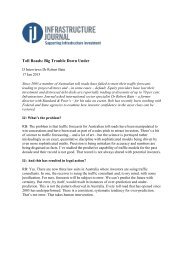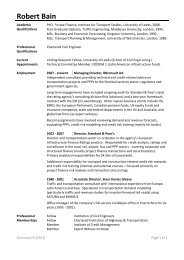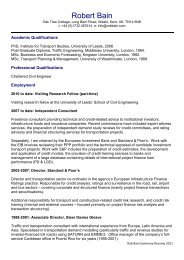Disincentivising overbidding for toll road concessions
Disincentivising overbidding for toll road concessions
Disincentivising overbidding for toll road concessions
- No tags were found...
You also want an ePaper? Increase the reach of your titles
YUMPU automatically turns print PDFs into web optimized ePapers that Google loves.
DISINCENTIVISING OVERBIDDING FOR TOLL ROAD CONCESSIONS<br />
••<br />
Economic and social impacts. Motorists benefit from a reduction in travel times associated with increased<br />
speeds due to the upgrades. Other benefits include increases in reliability, com<strong>for</strong>t and safety and improved air<br />
quality, and a number of new jobs during the construction period.<br />
In a climate where cost savings may become increasingly important to procuring agencies worldwide, the approaches<br />
being carried <strong>for</strong>ward in Texas (and beyond) may appeal to those seeking to reduce costs through private sector input,<br />
expertise and innovation, while still passing all design, construction and revenue risk to the concessionaire.<br />
3.6 International case studies and related <strong>toll</strong> <strong>road</strong> research: discussion<br />
Overview<br />
A review of the academic literature on <strong>toll</strong> <strong>road</strong> concession payment mechanisms finds that most analysis has<br />
focused on solutions that can be employed in the context of <strong>toll</strong>ing applications (i.e., user charging regimes). This<br />
reflects many studies undertaken by development bank personnel focused on applications of the traditional userpays<br />
<strong>toll</strong> <strong>road</strong> model in transitioning economies in Asia and Latin America; and a pressing need to guard against<br />
frequent and protracted contract renegotiations. 103 The scope of this report extends beyond that; hence, the wider<br />
discussion of availability-based payment mechanisms and the variants that can be applied when a state, rather than<br />
users, funds highway enhancements. The roll-out of <strong>toll</strong>ing initiatives may be better aligned with longer-term policies<br />
aimed at acclimatising the driving public to the principles of point-of-use charging and putting highway financing on a<br />
more sustainable footing.<br />
Overbidding and overselling<br />
In terms of <strong>overbidding</strong>, it is challenging to find a country with a sizeable portfolio of <strong>toll</strong> <strong>road</strong> <strong>concessions</strong> which<br />
has not, to some extent, suffered from <strong>overbidding</strong>—particularly when competition has been aggressive and where<br />
upfront payments (or minimum required subsidies) are used as a basis <strong>for</strong> contract award. The subsequent adoption<br />
of additional or alternative bid evaluation criteria is an often-observed direct result.<br />
Another trend observed internationally is an early-period tendency <strong>for</strong> governments themselves to over<strong>for</strong>ecast,<br />
effectively overselling potential <strong>toll</strong> <strong>road</strong> businesses to the private sector. 104 PPP teams or privatisation units want<br />
auctions to be profitable, bearing in mind the often high short-term financial rewards and the associated political<br />
gains. This may be exacerbated in the <strong>toll</strong> <strong>road</strong>s sector because of the lag between contract award and steady-state<br />
operations, reducing the potential <strong>for</strong> institutional learning as the individuals concerned may simply have moved on.<br />
Strategic biases and incentives can drive both private and public sector behaviour, and have an impact on demand<br />
<strong>for</strong>ecasts.<br />
Strengths and weaknesses<br />
Each of the payment mechanisms described earlier—in common with most initiatives designed to mitigate traffic<br />
risk—has strengths and weaknesses. With economic rebalancing clauses, <strong>for</strong> example, the private sector may<br />
have little incentive to reduce operating costs if a project’s internal rate of return is approaching its lower limit.<br />
Minimum traffic or revenue guarantees across a portfolio of projects can cause systemic problems if countries<br />
experience severe economic downturns. For these reasons, payment mechanisms are often tested under alternative<br />
hostile scenarios to highlight limitations and quantify possible state obligations (contingent liabilities). Widespread<br />
stakeholder consultation (possibly including <strong>road</strong>shows) can also identify application and appetite issues in advance<br />
of scheme implementation.<br />
103 The best bargaining chip <strong>for</strong> the private sector in renegotiations is often the financial distress of an essential infrastructure asset—hence, the<br />
policy interest in reducing the potential <strong>for</strong> financial distress in the first place.<br />
104 Estache, A. and de Rus, G. (2000), ‘Privatization and Regulation of Transport Infrastructure: Guidelines <strong>for</strong> Policymakers and Regulators’,<br />
World Bank Institute Development Studies, World Bank, Washington DC. This can even be done quite innocently through the incorporation<br />
of exogenous variable <strong>for</strong>ecasts in traffic models (such as those <strong>for</strong> population, employment and income growth), which may themselves be<br />
politically influenced.<br />
44






